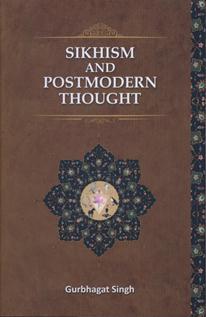- Contact Us | About Us
- info@naadpargaas.com
Sikhism and Postmodern Thought

Unsettling Boundaries
September 13, 2017
Oankari Gur-Vidhan (Bhatt Bani Viakhia) – Part 4
September 13, 2017Sikhism and Postmodern Thought
₹450.00 ₹425.00
Editor: Gurbhagat Singh
Author: Gurbhagat Singh
Publisher: Naad Pargaas
Hardcover: 184 Pages
Language: English
Genre: Religion/Literature
ISBN: 978-0-9875342-8-6
ISBN 9 780987 534286
10 in stock

Sikhism and Postmodern Thought
₹450.00 ₹425.00
Editor: Gurbhagat Singh
Author: Gurbhagat Singh
Publisher: Naad Pargaas
Hardcover: 184 Pages
Language: English
Genre: Religion/Literature
ISBN: 978-0-9875342-8-6
ISBN 9 780987 534286
10 in stock
About the Author
Gurbhagat Singh (1919-2014) was former Professor of English and Dean of Languages of Punjabi University Patiala. He received his inter-disciplinary M.A. and Ph.D. in English Literature from the University of California. He had taught at the universities in California, Delhi and Patiala. His chief interests were: Theory, Comparative Literature and Sikhism. He had participated in the Congress of International Comparative Literature Association held in New York, Munich, Paris, Sussex, Tokyo. His known books are: Poetry as Metaconsciousness, Western Poetics and Eastern Thought, Literature and Folklore after Poststructuralism, Vismad, Uttaradhunikwad (Pbi.), Vismadi Punji (Pbi). He had also translated Sri Guru Granth Sahib into English.
This volume explores the link between Sikhism and Postmodernism. Both, attack all kind of determinism and totalitarianism. While postmodern thinkers like Bataille, Foucault, Derrida, Lyotard, Deleuze, Guattari, Boudieu, Rorty, Geertz, Irigaray have through their works, attack the epistemic rationalist enterprise of the West that eliminates the difference of the Other/Subject. The main challenge before the postmodernism was to liberate the subject and free human beings from all types of Oedipal. The Sikh Gurus, although their texts were written in a different period in which the sultan/emperor was the central governing figure, evolved the concept of Sahaja to liberate the individuals from the Oedipal or the despotic ruler. To counter the carry territorializing strategies of the dominant classes, the Guru established a God who is creative, libidinal and wonderous, is not a rational sign. The Gurus’ collective effort was not only transforming individual psyche, but transforming a cultural psyche from repression to celebrative of other’s difference. For this the Guru used multiple strategies. This work traces the central themes of postmodernism and Sikhism: liberation of humankind and living in co-existential/sahaja of other difference.
| Weight | 580 g |
|---|---|
| Dimensions | 200 × 200 × 100 cm |
| Pages | 270 |









Reviews
There are no reviews yet.